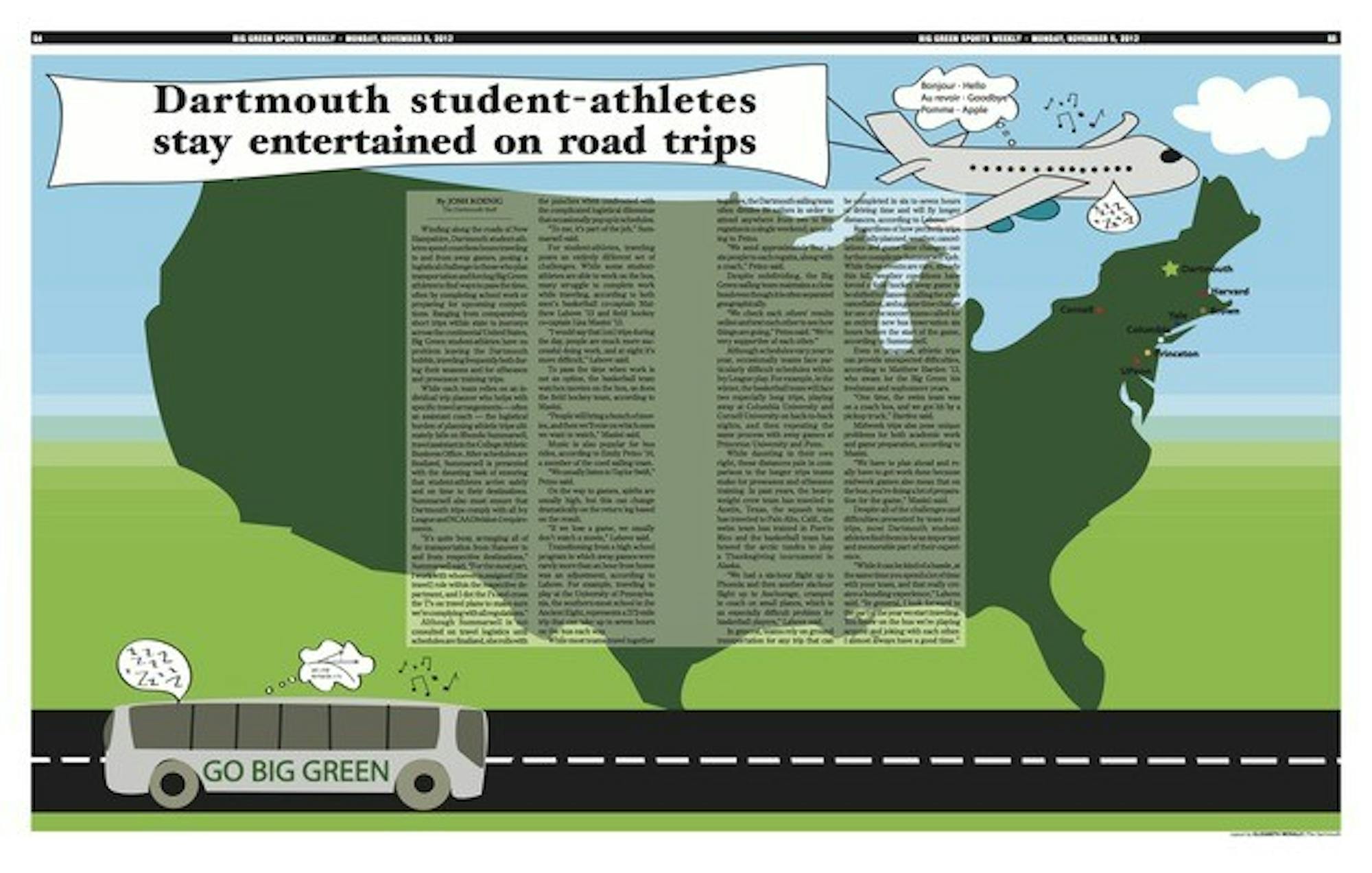While each team relies on an individual trip planner who helps with specific travel arrangements often an assistant coach the logistical burden of planning athletic trips ultimately falls on Rhonda Summarsell, travel assistant in the College Athletic Business Office. After schedules are finalized, Summarsell is presented with the daunting task of ensuring that student-athletes arrive safely and on time to their destinations. Summarsell also must ensure that Dartmouth trips comply with all Ivy League and NCAA Division-I requirements.
"It's quite busy, arranging all of the transportation from Hanover to and from respective destinations," Summarsell said. "For the most part, I work with whoever is assigned [the travel] role within the respective department, and I dot the I's and cross the T's on travel plans to make sure we're complying with all regulations."
Although Summarsell is not consulted on travel logistics until schedules are finalized, she rolls with the punches when confronted with the complicated logistical dilemmas that occasionally pop up in schedules.
"To me, it's part of the job," Summarsell said.
For student-athletes, traveling poses an entirely different set of challenges. While some student-athletes are able to work on the bus, many struggle to complete work while traveling, according to both men's basketball co-captain Matthew Labove '13 and field hockey co-captain Lisa Masini '13.
"I would say that [on] trips during the day, people are much more successful doing work, and at night it's more difficult," Labove said.
To pass the time when work is not an option, the basketball team watches movies on the bus, as does the field hockey team, according to Masini.
"People will bring a bunch of movies, and then we'll vote on which ones we want to watch," Masini said.
Music is also popular for bus rides, according to Emily Petno '16, a member of the coed sailing team.
"We usually listen to Taylor Swift," Petno said.
On the way to games, spirits are usually high, but this can change dramatically on the return leg based on the result.
"If we lose a game, we usually don't watch a movie," Labove said.
Transitioning from a high school program in which away games were rarely more than an hour from home was an adjustment, according to Labove. For example, traveling to play at the University of Pennsylvania, the southern-most school in the Ancient Eight, represents a 372-mile trip that can take up to seven hours on the bus each way.
While most teams travel together to games, the Dartmouth sailing team often divides its sailors in order to attend anywhere from two to five regattas in a single weekend, according to Petno.
"We send approximately four to six people to each regatta, along with a coach," Petno said.
Despite subdividing, the Big Green sailing team maintains a close bond even though it is often separated geographically.
"We check each others' results online and text each other to see how things are going," Petno said. "We're very supportive of each other."
Although schedules vary year to year, occasionally teams face particularly difficult schedules within Ivy League play. For example, in the winter, the basketball team will face two especially long trips, playing away at Columbia University and Cornell University on back-to-back nights, and then repeating the same process with away games at Princeton University and Penn.
While daunting in their own right, these distances pale in comparison to the longer trips teams make for preseason and offseason training. In past years, the heavyweight crew team has traveled to Austin, Texas, the squash team has traveled to Palo Alto, Calif., the swim team has trained in Puerto Rico and the basketball team has braved the arctic tundra to play a Thanksgiving tournament in Alaska.
"We had a six-hour flight up to Phoenix and then another six-hour flight up to Anchorage, cramped in coach on small planes, which is an especially difficult problem for basketball players," Labove said.
In general, teams rely on ground transportation for any trip that can be completed in six to seven hours of driving time and will fly longer distances, according to Labove.
Regardless of how perfectly trips are initially planned, weather, cancellations and game time changes can further complicate Summarsell's job. While these events are rare, already this fall, weather conditions have forced a field hockey away game to be shifted to Hanover, calling for a bus cancellation, and a game time change for one of the soccer teams called for an entirely new bus reservation six hours before the start of the game, according to Summarsell.
Even in progress, athletic trips can provide unexpected difficulties, according to Matthew Harden '13, who swam for the Big Green his freshman and sophomore years.
"One time, the swim team was on a coach bus, and we got hit by a pickup truck," Harden said.
Midweek trips also pose unique problems for both academic work and game preparation, according to Masini.
"We have to plan ahead and really have to get work done because midweek games also mean that on the bus, you're doing a lot of preparation for the game," Masini said.
Despite all of the challenges and difficulties presented by team road trips, most Dartmouth student-athletes find them to be an important and memorable part of their experience.
"While it can be kind of a hassle, at the same time you spend a lot of time with your team, and that really creates a bonding experience," Labove said. "In general, I look forward to the part of the year we start traveling. You know on the bus we're playing around and joking with each other. I almost always have a good time."




